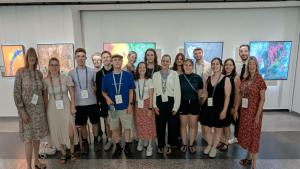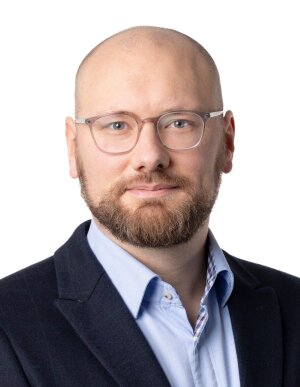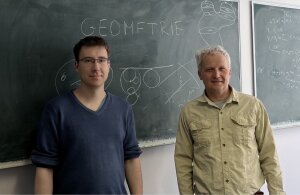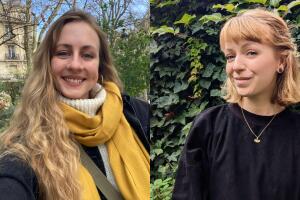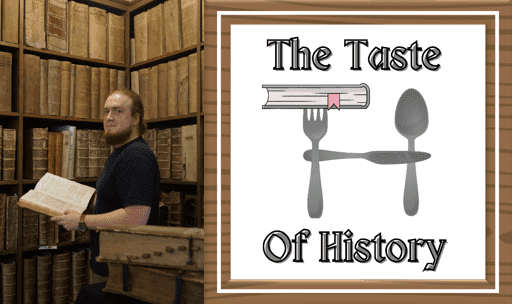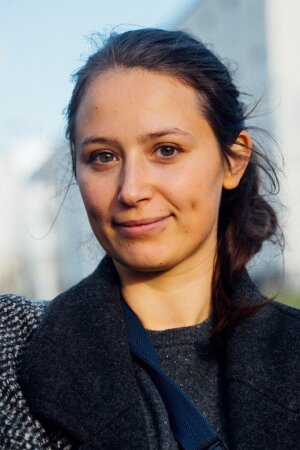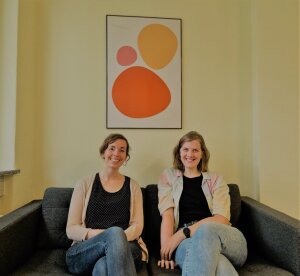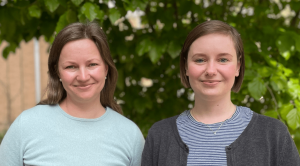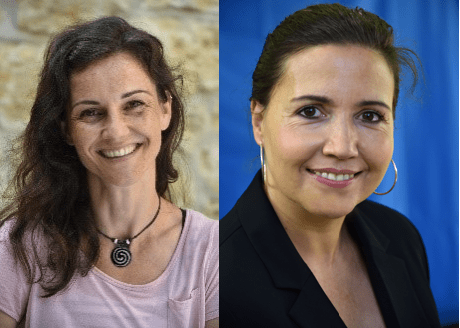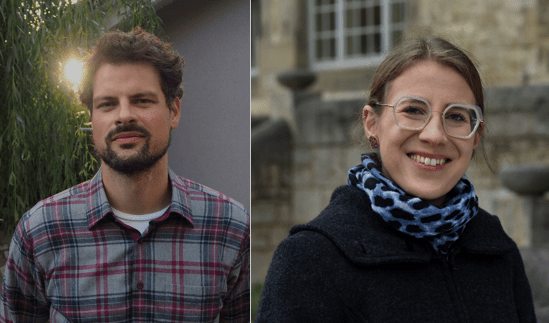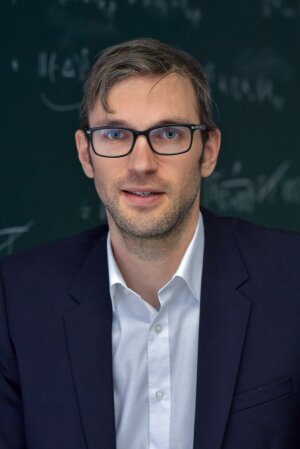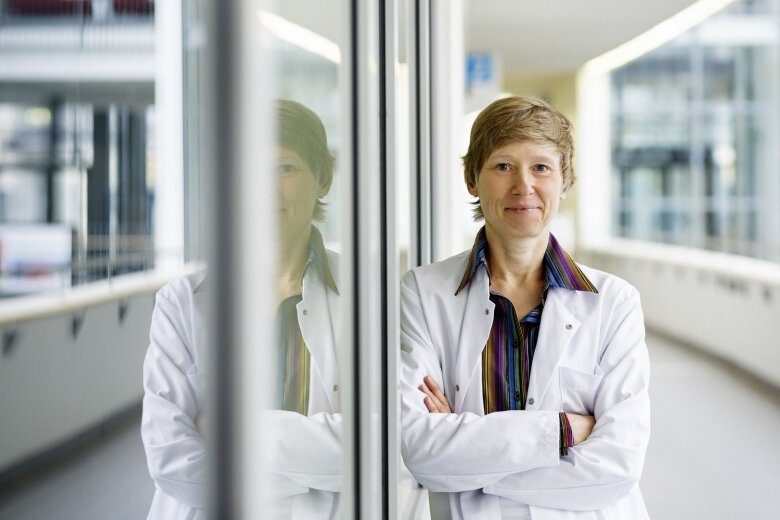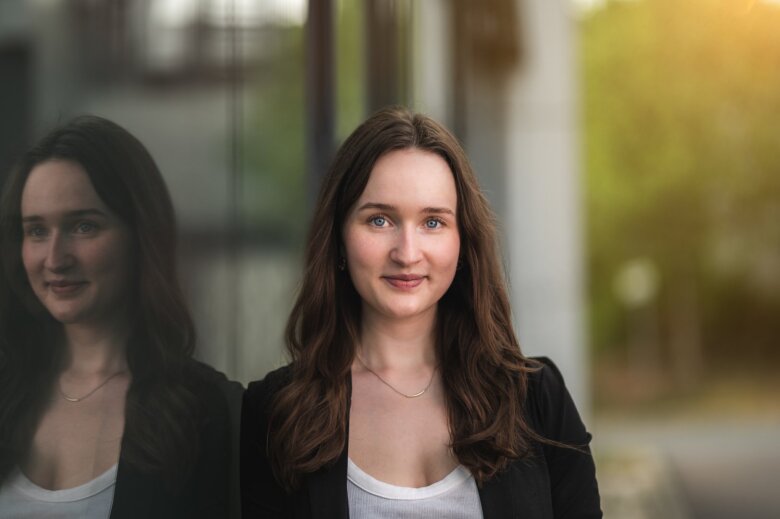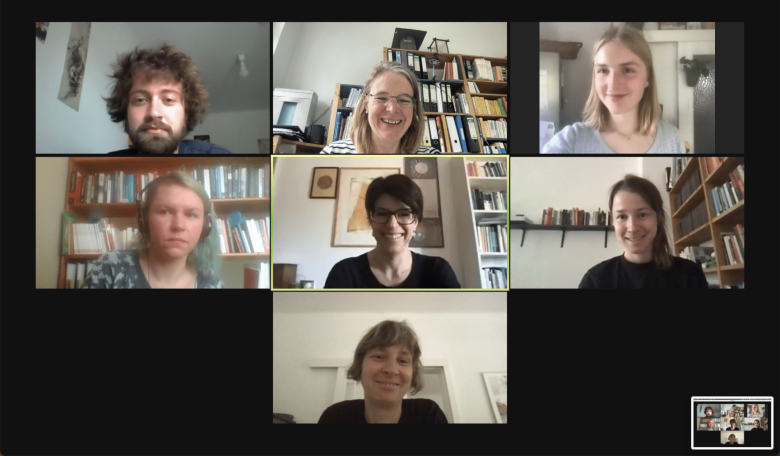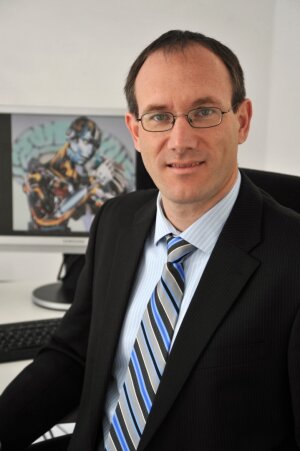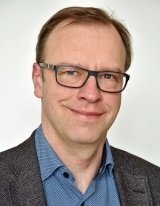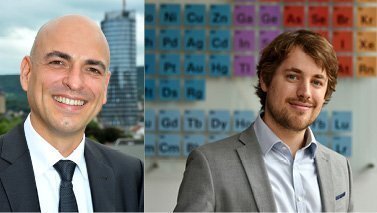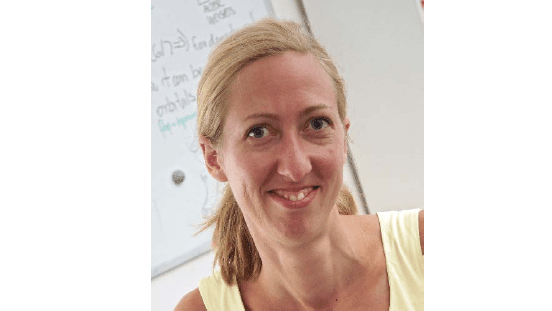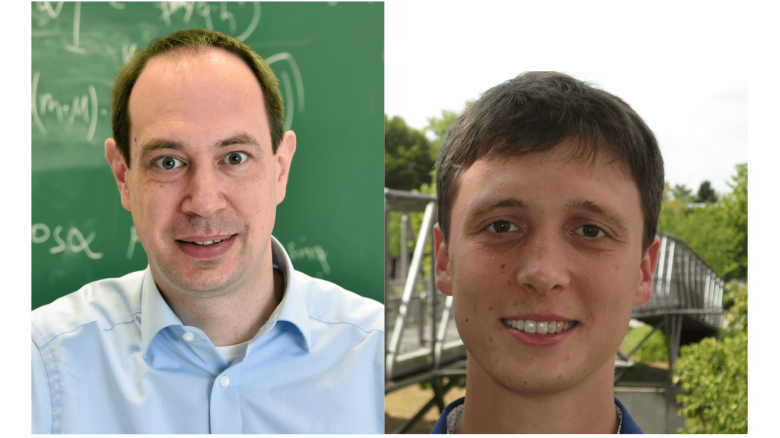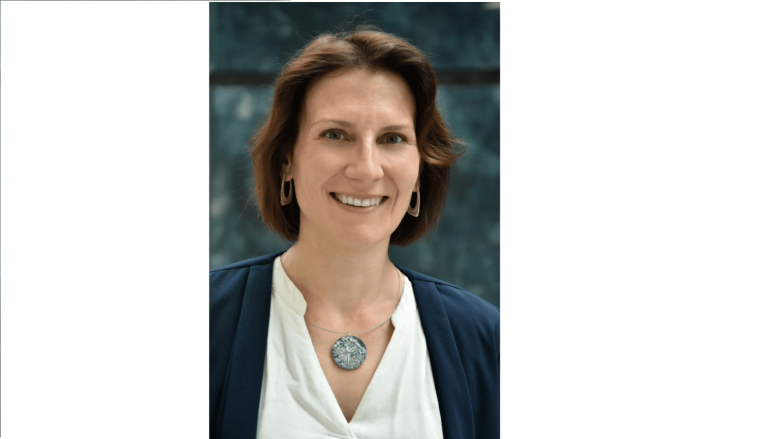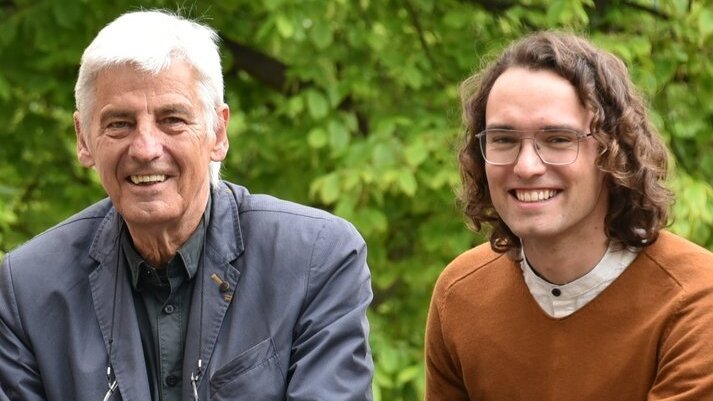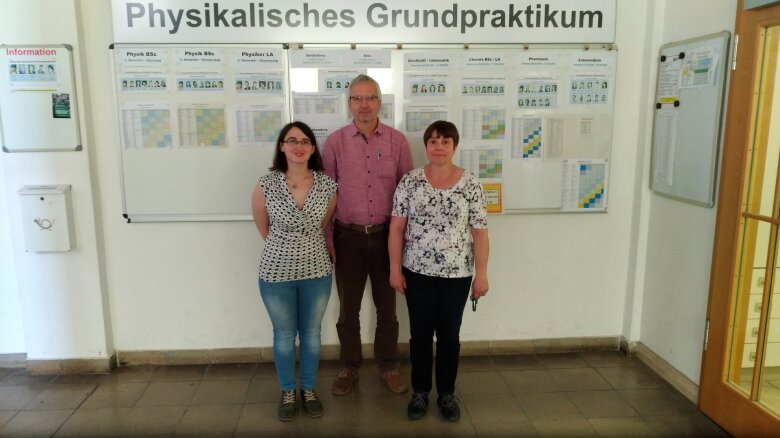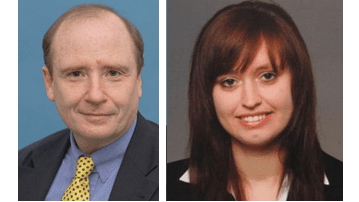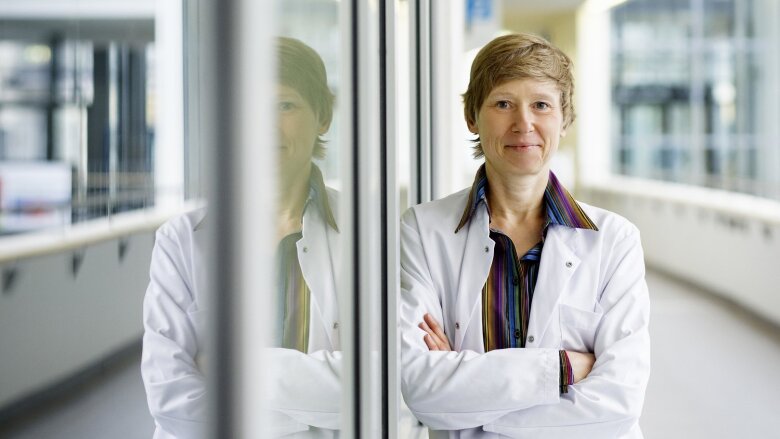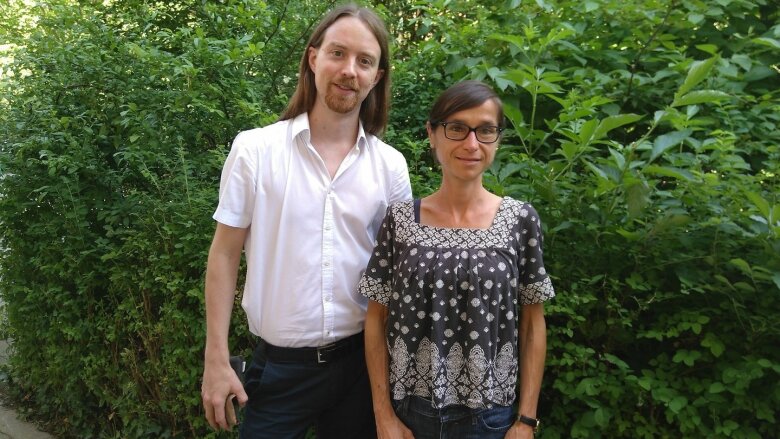
funding decision in 2025
-
AI and Machine Learning for All: Exploring Applications in Geosciences
project leader Saeid Sadeghnejad
Image: Dr. Thorsten SchaeferArtificial intelligence (Al) is transforming Geoscience by enhancing the analysis of complex geological
data. lt advances predictive modelling for natural disasters, aids in resource exploration, boosts
environmental monitoring, and provides sustainable solutions for subsurface energy storage and
extraction. This innovative course integrates machine learning (ML) with Geoscience applications
through problem-based learning (PBL), cross-disciplinary projects, and hackathons, offering an
engaging experience for master's students and doctoral researchers. The PBL approach enhances
critical thinking, problem-solving skills, and student motivation. The developed interactive tools and
online games teach ML concepts practically and dynamically. The course promotes inter-institutional
networking within Friedrich-Schiller-University Jena through holding of interdisciplinary Hackathon
events. lt also includes reusable materials and adaptable methodologies, allowing transfer to other
institutes and scalability across various academic disciplines. -
Water in North America: Remote Sensing and Literary Studies in Dialogue. A cross-faculty seminar with a conference visit to the ESA Living Planet Symposium
Group photo ESA excursion
Image: Prof. Christiane SchmulliusThe major challenges of our time with regard to water pollution, droughts, flooding and melting ice can only be solved through dialogue between the natural sciences and the humanities. This seminar aims to contribute to this dialogue and enable students to take a transdisciplinary look at the topic of water and its monitoring using various methods and approaches. The seminar is aimed at Master's students of remote sensing as well as Master's students and state examination candidates of English/American Studies. We will deal with the following phenomena of the water cycle: Clouds and rain, glaciers and ice, rivers and lakes, wetlands and soil moisture - combining physical-technical methods of remote sensing with literary-theoretical approaches such as the Blue Humanities. The centrepiece of the seminar is a joint excursion to the European Space Agency's ‘Living Planet Symposium’ in Vienna from 23-27 June 2025, the world's largest environmental observation conference. Participants must develop a joint response.
project leader: Prof. Dr. Caroline Rosenthal and Prof. Dr. Christiane Schmullius
-
Personal AI learning assistant for students at the Faculty of Business Administration and Economics
project leader: Prof. Dr. Michael Wessel
Image: Bjarke MacCarthyStudents are increasingly using generative AI such as ChatGPT. Despite their great potential for university teaching, their use is associated with challenges. The systems can generate incorrect information that is accepted without critical scrutiny. There is no possibility for continuous interaction, which means that personalised learning support is not guaranteed. Basic skills such as critical reflection and creative problem solving can be undermined if students rely too heavily on AI-generated answers.
The aim of the project is to develop a personalised AI learning assistant that addresses these challenges through several innovative features: Retrieval-Augmented Generation (RAG) enables technically correct, source-based answers. Persistent learning paths and adaptive feedback promote continuous, independent learning. Gradually reduced assistance prevents the loss of analytical skills. The use of open-source models on local systems ensures data protection and equal opportunities.
-
Financial App Development
project leader: Prof. Dr. Benjamin R. Auer
Image: Sophie AuerIn the summer semester 2024, I offered the ‘Financial App Development’ seminar for the first time, which is unique in Germany and teaches both financial and digital skills in a contemporary way. It enables participants to independently design and programme smartphone apps that provide investors with scientifically sound support for their investment decisions. This modern form of training is intended to strengthen Jena as a centre of innovation and lay the foundations for a successful career start or self-employment.
During the test phase of the summer semester 2024, an app for sustainable portfolio optimisation was developed in the seminar, which was awarded a cash prize by Optimax Energy GmbH. Due to this positive response, the seminar is to be expanded and permanently anchored in the curriculum. This requires the development of new app ideas and the purchase of financial market data sets for app functionality tests.
The extent to which a supplementary programming tutorial can promote the seminar's success and results will also be tested. -
Digital learning and test formats for geometry
project leader: Dr. Manuel Quaschner and Prof. Dr. Vladimir Matveev
Image: Dinmukhammed AkpanThe aim of this project is to introduce new learning and mid-term review measures in the ‘Geometry for Teacher Training’ module, with which students can review the pre-solution material and recognise gaps in their understanding more quickly. To this end, we would like to implement the following offers in addition to the homework:
- Voluntary quizzes for students to review the lecture material
- Cloze texts or similar formats to repeat the most important proofs of the lecture
- Compulsory tests to check the students' level of knowledge.
In addition to these digital elements, appropriate support for students with questions should also be guaranteed in the first phase (in addition to regular tutorials), also in order to test the effectiveness of the methods and adapt them if necessary. In order to implement this, we need two student assistants to support us with supervision, adapting the content of the questions and the technical implementation in Moodle.
-
Practical workshop - leading conflictual counselling situations professionally at school
project leader: Susan Beatrice Müller and Anica Löchel
Image: Susan Beatrice Müller/Anica LöchelThe project: ‘Practical workshop - leading conflictual counselling situations professionally at school’ includes the first implementation of an innovative workshop offering for learning counselling practices for students in the teaching profession at the FSU Jena. The workshops are to be connected to the seminar programme of the modules L 4a/ L2a. The workshop programme is intended to increase the practical component within the modules mentioned, thus further increasing the learning effects of the students and in this way enabling a successful transfer of practical experience. To this end, in the workshop framework and in collaboration with the head of the improvisation theatre at the Leipzig Adult Education Centre Tabea Musolff and two other actors, realistic counselling scenarios will be brought to life for the students. In addition to trying out counselling techniques, the workshop focuses in particular on reflecting on one's own position and experiences in counselling. This pilot project is intended to open up perspectives for anchoring the programme in the curriculum.
funding decision in 2024
-
The Taste of History
project leader Max Grund
Image: Max GrundThe aim of the project is to put historical knowledge into practice and thus bring history to life. As part of the planned exercises, questions of medieval food history will be discussed using surviving medieval cookery books. The aim is not only to acquire new source knowledge in palaeography and codicology. The innovative approach is to put what has been read into (modern) practice after critical reflection and the necessary adaptation. Differences between (theoretical) reconstruction and practice are also thematised. Through the documentation of problems and solutions, a close evaluation and general reflection, a guideline is to be created that also enables the implementation of the teaching concept in modules of other epochs/subjects. The practical implementation of historical instructions also prepares students for future careers, for example in museums, open-air museums or schools.
-
Archive seminar on contemporary history
project leader Emilia Henkel
Image: Benjamin JenakWith the help of ALe funding, a seminar for 13 advanced history (teacher training) students was designed and held for the first time in collaboration with the Schmalkalden City and District Archives. The seminar focused on working in archives and with archival material, as well as communicating historical knowledge outside the university. The aim was to enable students to practice two core skills for aspiring historians that are often neglected in regular seminars due to the increased organizational, cooperation, and travel requirements. After two preparatory sessions in Jena, the seminar took place in Schmalkalden in two two-day blocks. In the first block, the students familiarized themselves with the archive and independently researched a source collection, which they then worked on during the following self-study phase with the help of a research question. In the second block, the students presented their results in the form of a poster presentation at a public evening event in Schmalkalden, which gave the local community an insight into the holdings of their archive and the work of the University of Jena.
Follow the link below to find out more about the student contributions to the archive seminar:https://www.gw.uni-jena.de/74404/studierende-oeffneten-archivkartons deHereThis link requires a loginde you can find the final project report (URZ login credentials required).
-
Old languages digital and networked
project leader: Dr. Susanne Kochs and Prof. Dr. Ulrike Kaiser
Image: Tommy DrexelStudents of Protestant theology invest a lot of time in learning two (teaching degree) or three ancient languages, especially at the beginning of their studies: Hebrew and/or Greek and Latin. The planned innovation project aims to use Bible software to help consolidate language knowledge, facilitate its application and constructively link it with theological subject content. To this end, the use of the LOGOS software, for which licences can be provided through the project funding, is to be integrated into the language lessons (Greek I). Practising the essential research functions of the software - in particular the semantic indexing of word fields and concordant searches - will then be further deepened in the proseminar (NT). In the long term, the introduction to the Bible software should open up the possibility of having practised barrier-free, quick access to the source-language text not only in further studies, but also in later professional life, which will also become a matter of course in any application.
HereThis link requires a loginde you can find the final project report (URZ login credentials required).
-
Vis-a-vis - video-based interaction sequences as a bridge from theory to psychotherapeutic practice
project leader Prof. Dr. Julia Asbrand and Dr. Nele Dippel
Image: Doreen HarnischPsychotherapy training was fundamentally reformed in 2019. Much of the content previously taught in postgraduate training was integrated into the degree programme with the aim of teaching in a practical and evidence-based manner. This fundamental reorientation of the degree programme also requires a reformation of the teaching system. Students must now learn evidence-based psychotherapeutic skills in university courses and be able to test them in preparation for real patient contact. Vis-a-vis creates a step-by-step bridge from theory (knowledge) to practice in the field (action competence) by using a video-based interaction system for students. The teaching innovation will address several challenges of current teaching needs, from diversity to evidence-based application orientation within the degree programme, in a scientifically sound framework programme.
funding decision in 2023
-
Podcasts as a digital examination format - implementation, accompanying research and transfer
left to right: project leader Dr. Susann Schäfer and Anika Zorn
Image: Imke HurlinThe increasing digitalisation of society and the economy enables new learning and teaching practices and requires digital skills from individuals. Universities can utilise these opportunities and empower students by using digital examination formats. The project ‘Podcasts as a digital examination format’ deals with the opportunities and limitations of an alternative examination method: the conception and production of a podcast sequence on a scientific topic. The aim of the teaching research project is to use podcast(s) as an examination format in courses and to analyse the progress in skills achieved in this context through accompanying research following the course based on social science approaches (survey, focus groups). At the end of the project, the results of the teaching research will be published in a scientific journal and transferred as ‘good practice’ to workshops organised by the Teaching and Learning Service Centre at the University of Jena.
HereThis link requires a loginde you can find the final project report (URZ login credentials required).
-
Development of cooperative teaching games for university teaching programme
project leader Dr. Nicole Kämpfe and Dr. Susanne Volkmar
Image: Anne Günther (University of Jena)Teachers can no longer be successful in coping with the complex day-to-day school life as lone fighters, but should acquire cooperative skills as part of their training (KMK, HRK, 2015). The current KMK education report also reveals specific content for which there is a demonstrable gap in university teacher training. One of these is dealing with mental health problems in a school context.
The project aimed to develop ‘educational games’ based on simulation games, which enable trainee teachers to work on authentic educational challenges in a cooperative manner. As part of the funding, various educational games were developed, tested and evaluated with students from two degree programmes (teacher training, Master's in Social Pedagogy). The evaluation results show that the development of the educational games by the students of the different degree programmes already promotes positive attitudes towards multi-professional cooperation, specialist knowledge of student mental health issues and methodological knowledge.HereThis link requires a loginde you can find the final project report (URZ login credentials required).
-
Python Learning Steps: Longitudinal acquisition of subject-specific digital skills through guided and collaborative learning
project leader: Dr. Volker Schwartze
Image: Cora AssmannThe advancing datafication and digitalisation of our society is changing the way we live and work. While the use of digital tools is now part of everyday study for most, the benefits of independent programming are still little used. Basic knowledge of programming languages can help to develop a better understanding of digital technologies and their possible applications. However, suitable courses are not yet available for all students or offer few opportunities for subject-specific application and consolidation.
In the project, a digital self-study course on the Python programming language is to be developed and tested. The course is intended to offer students the opportunity to familiarise themselves with the basics in a flexible manner and to expand on them through subject-specific application examples. At the same time, networking opportunities are to be created that will contribute to the formation of an active community at the university.
Funding decision in 2022
-
Ethics in biographical perspective - women theologians from East and West tell stories
Jun.-Prof. Dr. Sarah Jäger and Johannes Müller
Image: Rabea BrackThe project comprises a main seminar that combines the teaching content of church history and ethics. The aim is to discover ethics in the sense of narrative ethics in concrete life stories. In this way, students learn to situate their own ethical decisions historically and to reflect on them critically. Female theologians from East and West Germany (born between 1940 and 1960) were interviewed as contemporary witnesses using oral history methods on ethical topics that shaped their own (ecclesiastical) careers. For West Germany, Antje Heider-Rottwilm or Christine Busch, for East Germany Kerstin Gommel. This enables access to ethical issues of the 1980s and 1990s such as peace, the environment, feminism and equal rights, homosexuality, etc. The interviews were also prepared and followed up in the seminar with literature work. Finally, meaningful short films were created from the interviews, which were then published online.
HereThis link requires a loginde you can find the final project report (URZ login credentials required).
-
Podcast and Seminar: Literature review
project leader Prof. Dr. Jonas Sauer
Image: Jürgen Scheere (University of Jena)The combined seminar/podcast concept 'literature review' is aimed at advanced students with an interest in mathematical research. The podcast provides insights into the various existing works in a specific subject area of mathematical analysis and at the same time sheds light on the international networks of people that are not easy for students to understand. Students in specialised lectures often find themselves in the situation that they would like more orientation in the existing literature. The "Literatur-Rundschau" proactively addresses this situation and provides students with a guideline to enable them to draw on a broader horizon of knowledge when selecting and writing their theses. Ideally, students will have developed a research question for their final thesis by the end of the module.
HereThis link requires a loginde you can find the final project report (URZ login credentials required).
-
Digital health literacy for all: Teaching concept for a cross-faculty block seminar
Project leader: Prof. Dr Jutta Hübner
Image: Anne Günther (University of Jena)Digital health literacy has been on everyone's lips at least since the Covid pandemic and is at the same time a prime example of the necessity of interprofessional teaching. After all, hardly any other topic affects so many health professions equally. However, there are nearly no courses that address the topic interprofessionally and convey the knowledge to our students in a practical way. We would like to offer the inter-faculty seminar "eHealth Literacy" in order to close this gap and to do justice to the current changes in the health system in teaching. Students from different disciplines will prepare for guided discussion and exchange of perspectives on various aspects of eHealth interventions because of specially created teaching videos and selected publications. The course concludes with an overarching practical project with complex case studies in study-discipline heterogeneous groups.
HereThis link requires a loginde you can find the final project report (URZ login credentials required).
-
'Let me pass, I'm a psychologist!' Acquisition of emergency psychological competence via the methodology of forum theatre
project leader: Laura Sophia Sterba
Image: Manuel GlatterThe project enabled students of the Bachelor of Psychology to learn about, apply and critically reflect on intervention techniques in emergency psychology. After teaching basic emergency psychology skills, groups of students developed emergency-specific interventions for dealing with those affected. An intensive application and reflection of these interventions took place in the seminar sessions by using the methodology of forum theatre according to Augusto Boal. The individual student working groups acted out the various emergency situations together with professional actors, in which they themselves acted as emergency psychologists and the actors took on the role of those affected. Together in the plenary, a critical reflection and processing of the procedure took place by working out and trying out different procedures and discussing their influence on the situation.
HereThis link requires a loginde you can find the final project report (URZ login credentials required).
-
Problem-based learning in the context of academic psychotherapy studies using the example of the applied subject Clinical Psychology
project leader: Prof. Dr. Ilona Croy and Dr. Marcel Franz with team Fabian Rottstädt and Carina Heller
Image: Antonie BierlingThe teaching project enabled psychology students on the bachelor's degree programme to apply the basic theoretical knowledge of mental disorders acquired in the clinical psychology lecture to practical, clinical-psychological issues and to critically question them. Based on the method of problem-oriented learning (POL), a total of seven case studies and problems derived from them were developed, which were located in different diagnostic and treatment contexts (outpatient, day-care or inpatient setting). Extensive teaching materials were created for this purpose (e.g. video vignettes of diagnostic interviews with drama patients, comprehensive reports on the results of diagnostic procedures and medical findings). In the subsequent trial phase, the individual case studies were worked on in small student groups over the course of two seminar sessions, discussed and then reflected on together in plenary sessions.
HereThis link requires a loginde you can find the final project report (URZ login credentials required).
Funding decision in 2021
-
'Willst du mich behandeln, musst du wissen wer ich bin' – Discrimination-aware and diversity-oriented teaching in medicine
Project leaders: Prof. Dr Marie von Lilienfeld-Toal and her team
Image: Prof. Dr. Marie von Lilienfeld-ToalThe innovative and interdisciplinary teaching project "If you want to treat me, you have to know who I am" is aimed at medical students in the clinical semesters and imparts
basic knowledge and skills about diversity in medicine and (structural) discrimination, as well as critical awareness of it. The idea of intersectionality is central to the teaching concept. Students learn medical and sociological knowledge as well as an awareness of the patients' perspectives in the interdisciplinary seminar and workshop series. In addition, the interactive seminars serve to identify the deficits of medical curricula in a research-oriented way. These can be addressed in later teaching and research practice.HereThis link requires a loginde you can find the final project report (URZ login credentials required).
-
Flexible, interactive e-Learning with Literate Programming
Project leader: Prof. Dr Alexander Brenning
Image: Anne Günther (University of Jena)Data science methods of geoinformatics and statistics are key competences that have a special significance in the Geography programme of Jena. Their teaching is primarily aimed at application and critical interpretation of results. A frequently requested adaptation by students is the provision of diverse application scenarios with reference to different subject interests and professional fields.
We met this challenge with innovative programming techniques. With the respective learning objectives in mind, exercise task schemes were developed, which are automatically processed from a task collection into interactive online tasks with the help of the programming language R, which are finally integrated into the learning platform Moodle. Furthermore interactive, browser-based Shiny apps were developed in R, which serve to teach more demanding geoinformatics methods such as spatial interpolation. The online exercises are regularly used in several modules in the geography courses, and the interactive apps developed are now being successively integrated into the teaching.
HereThis link requires a loginde you can find the final project report (URZ login credentials required).
-
Digital vocabulary learning cards for ancient languages
Project leader: Dr Roderich Kirchner
Image: Anne Günther (University of Jena)This project served to develop or further develop specialised learning software and to provide vocabulary learning cards for the ancient languages. The Latin and Greek courses at the FSU require intensive learning. Central to this is the learning of vocabulary and the repetitive training of the acquired vocabulary. The teaching material is usually tailored to the courses; therefore, there are no offers from commercial education providers. Within the framework of the project, digitally available data sets on Latin and Greek vocabulary, root forms and idioms were processed and implemented in the software.
HereThis link requires a loginde you can find the final project report (URZ login credentials required).
-
Chemistry studies 4.0: Digitalisation in chemistry
Project leaders: Prof. Dr Ulrich S. Schubert and Prof. Dr Timm Wilke
Image: Anne Günther (University of Jena)Central elements of digitalisation were integrated into the chemistry degree programme in a new course offering, initially designed for training at Master's level. For this purpose, a module was developed that teaches students the content of programming, databases and artificial intelligence. In the associated seminar, they apply the knowledge they have acquired and develop their own programmes for practical chemical problems in the area of measurement data acquisition, visualisation and evaluation.
The project-oriented character opens up spaces for the development of own systems with which questions from one's own area of interest can be addressed. The best results can then be transferred to final theses or, if necessary, to other courses. The transferability of the seminar concept to other degree programmes with practical laboratory courses is foreseeable.
HereThis link requires a loginde you can find the final project report (URZ login credentials required).
Funding decision in 2020
-
From Digitization to Differentiation
Project leaders: Clemens Hoffmann, Elizabeth M. Watts and Julia E. Fleischmann
Image: PrivatProject leader: Dr Elizabeth Watts
Heterogeneity in classes is on the rise and so teaching must be increasingly differentiated so that different competences can be realised. Digitisation offers teachers the possibility to differentiate their lessons more easily. Therefore, it is necessary to develop adequate teaching training that prepares future teachers not only to teach digitally, but also to teach differentiated. The course "From Digitisation to Differentiation" has contributed to filling this gap in education, whereby student teachers were not only able to get to know new digital approaches better, but were also given concrete examples of how they could use such digital media for differentiation in the classroom. The course was attended by all student teachers of science subjects, and subsequently also by student teachers of special needs education in cooperation with the School of Education in Erfurt.
HereThis link requires a loginde you can find the final project report (URZ login credentials required).
-
Virtual Chemistry
Project leader: Prof. Dr Stefanie Gräfe
Image: Jan-Peter Kasper (University of Jena)The Corona crisis has released a strong digitization push in university teaching. The goal is to focus on digital education, the development and implementation of modern educational concepts to integrate them into the everyday life of science teaching. We have decided together with the MPSP to create a learning app for digitizing the learning content of Physical Chemistry with a constantly growing of learning ideas, good-practice examples, videos and digital learning environments. Modern technical approaches visualization were used to support students in training their spatial imagination, to develop a 3D image of the molecules and thus a better understanding in the context of this project. Two different approaches were used: (1) the (inter)active "Experiencing" the 3D environment through virtual reality (VR). (2) The "touching" of larger molecules and systems through plastic molds created via a 3D printer. We decided on short notice to replace the haptic component (2) or to consider it temporally downstream due to the pandemic-related changeover to hybrid teaching formats. Instead of that, we focused primarily on spatial imagination via augmented reality (AR) via the aforementioned app on mobile devices mentioned above.
HereThis link requires a loginde you can find the final project report (URZ login credentials required).
-
Profession-Oriented Supplementation of Theoretical Physics in the Physics Teacher Training Programme
Project leaders: Prof. Dr Holger Cartarius and Phlipp Scheiger
Image: Links: Anne Günther, Rechts: Ronny NawrodtThe fundamental concepts of theoretical physics are undoubtedly important for physics teacher training. They help future teachers to gain sufficient technical sovereignty to be able to concentrate on teaching in everyday school life. However, the associated courses are perceived as difficult by the students and their relevance for later teaching is often not perceived. Thus, there is a danger that a great potential of the study programme is not used. In this teaching innovation, the theoretical physics courses were supplemented by combined subject-specific didactic seminars in such a way,
so that their profession-oriented use for the teaching profession is worked out and the link to school physics is recognisable. Accompanying seminars were developed, which can be firmly transferred into the modules of theoretical physics through a parallel initiative of the Faculty of Physics and Astronomy.HereThis link requires a loginde you can find the final project report (URZ login credentials required).
-
Digitization of the 'Propaedeutic for the examination review in civil & public law'
Project leader: Dr Marion Schmidt-Wenzel
Image: Anne Günther (University of Jena)The ""Propaedeutic for the examination review in civil & public law" is intended to facilitate the students an introduction to the one-year university exam preparation. The six-week course took place prior to the Corona pandemic on a 16-hour weekly basis as a purely face-to-face course beginning in September. However, due to the timing, it was not possible for all students in the target group to attend the course.
Within the framework of the funding from the Academy for Teaching Development, the
questions and exam notes, as well as the learning techniques, were implemented digitally.
Now, the learning material is also supplemented and supported with digital formats. Among other things, learning level tests as well as teaching and learning videos are used. This should enable students to organize their self-learning time efficiently and individually.
Due to the fundamental approach, the videos can not only be repeated in the upcoming
not only repeatedly in the upcoming courses of the propaedeutic course, but also in other
exam preparation.HereThis link requires a loginde you can find the final project report (URZ login credentials required).
Funding decision in 2019
-
FNU: Training Module for the Introduction to Interdisciplinary Science Teaching
Project leaders: Prof. Volker Woest and Clemens Hoffmann
Image: Anne Günther (University of Jena)As part of the ProfJL project (Professionalization from the Start in the Jena Model of Teacher Education), a teaching-learning programme was developed for student teachers of biology, chemistry and physics, which is intended to prepare students for interdisciplinary science teaching in a way that is both school-relevant and practice-oriented. With the help of funding from the Academy for Teacher Development, the teaching-learning programme will be continued and the links between the individual subject didactic training areas strengthened. In this way, the contents are to be anchored in the long term as important components of the science teacher-training programme. One approach to this would be the implementation of the teaching-learning offer as a separate module in the required elective area. A pool of materials consisting of practical examples, methods, and opportunities for reflection serves as a basis for this and will be further expanded.
Here [pdf, 981 kb] deThis link requires a loginde you can find the final project report (URZ login credentials required).
-
Latin for and in Philosophy
Project leaders: Prof. Dr Perkams and Tim Haubenreißer
Image: Anne Günther (University of Jena)A large and significant part of basic philosophical texts is in Latin. For a research-oriented study of philosophy, knowledge of this language is therefore indispensable in order to find meaningful access to these original texts, to examine the quality of the translations, to understand them as the product of hermeneutic processes, but also to be able to critically and analytically process texts in the first place. Although Latin teaching has the potential to teach philosophical topics and working methods in a targeted way and thus to create more popularity for itself, at the University of Jena and elsewhere, the focus is mainly on practising grammar and vocabulary without reference to the subject. In order to address this situation, a course- and competence-related Latin course will be taught from the summer semester 2019 to the winter semester 2019/20 in the seminar ‘Latin for Philosophers: Texts, Discussions, Perspectives’. The innovative project is also intended to serve as a platform for students to contribute their ideas and, in the medium term, aims to make a corresponding teaching offer permanent, which should be a model for other languages and degree programmes and an advantage for the University of Jena.
Here [pdf, 3 mb] deThis link requires a loginde you can find the final project report (URZ login credentials required).
-
Physics Internship for Medical Students 2020
Project leaders: Sabine Stück, apl. Prof. Frank Schmidl and apl. Prof. Katharina Schreyer
Image: Anne Günther (University of Jena)As part of the restructuring of medical studies ‘Masterplan Medizinstudium 2020’, preclinical training will also face increased demands that require a reorientation in teaching. Therefore, we planned to transfer the physics practical course for medical students from a pure practical course to a new form of practical course consisting of a coordinated mixture of interactive co-seminars and subsequent independent experiments.
The novel combination of co-seminars, as a quasi-interactive lecture with combined practical exercises by the students, preceded by the actual practical course, is intended to ensure a more optimal training of all students in directly comparable areas identified as important for further medical studies. In addition to deepening and consolidating the subject-specific foundations for the subsequent teaching sections in the preclinical phase (especially physiology), the prerequisites for possible later clinical research were also to be created.Here [pdf, 2 mb] deThis link requires a loginde you can find the final project report (URZ login credentials required).
-
Blended Learning and Gamification for Bridging Courses in Business Information Systems
Project leader: Prof. Dr Ruhland and Frau Berger
Image: privatDatabase systems are of central importance in the research and teaching field of business informatics. It has been known for years that the heterogeneity of the prior knowledge of the participants in the Master's programmes requires the delivery of bridging courses. A blended learning concept allows efficient use of the university's own personnel capacities and Internet offerings. Expanding this with elements of gamification not only promises to keep interest high in general, but also makes those learning elements more exciting that are generally considered particularly dry, but are indispensable for in-depth academic discussion. Key competences are developed along the way.
Here [pdf, 457 kb] deThis link requires a loginde you can find the final project report (URZ login credentials required).
Funding decision in 2018
-
Internationalization through Digitization: Virtual Cross-Border Business Games
Project leader: Prof. Dr Jürgen Bolten
Image: Anne Günther (University of Jena)With the aim of linking internationalization and digitization, a virtual intercultural business game was developed within the framework of the project. In future, it can both be a fixed part of the supplementary subjects in the Bachelor’s programme Intercultural Business Communication and be used by other subjects of the Faculty of Humanities, the Faculty of Economics and the Faculty of Behavioural Sciences as well as the Language Centre. The business game uses a virtual classroom, which in turn is integrated into a Moodle platform. Both provide the basis for student teams from three international universities to interact together. The aim was to make it possible to experience challenges of intercultural action ‘live’ and to be able to reflect on corresponding challenges. The project work included the creation of text- and video-based handouts for independent use by lecturers.
Here [pdf, 772 kb] deThis link requires a loginde you can find the final project report (URZ login credentials required).
-
Oncological Case Conferences in Student Teaching
Project leader: Prof. Dr Jutta Hübner
Image: Anne Günther (University of Jena)Based on the simulation of case conferences, medical students in the 9th subject-related semester will gain fundamental insights into the development of therapeutic strategies in multimodal therapies, the interaction of different disciplines and professional groups, and interdisciplinary and multiprofessional communication. The focus was on understanding complex therapy processes, taking into account the therapy goal, communicating about this with the patient and supporting informed decision-making. In 6 seminars, 6 selected tumour types and different therapy situations (initial diagnosis to palliative situation) were discussed.
In the course of the semester, interim evaluations serve to adjust the concept if necessary. The results of the final evaluation and experiences are to be scientifically published and presented. The project result in the creation of a sustainable concept for student teaching that can be transferred to other subjects.
Here [pdf, 661 kb] deThis link requires a loginde you can find the final project report (URZ login credentials required).
-
Integrative Argumentation Didactics
Project leaders: Jun. Prof. Dr David Löwenstein and Dr Peggy Hetmank-Breitenstein
Image: Anne Günther (University of Jena)Analysing and evaluating as well as developing arguments on one's own is not only a philosophical core competence, but also essential in other fields both inside and outside the university. The subject of philosophy has a special responsibility to promote the development of these competences. Yet an integrative didactics of philosophical argumentation, which aims to combine both analytical and logical as well as productive-creative argumentation skills, has remained a desideratum to this day. With our project, we wanted to systematically teach and further develop the teaching of formal logic, which is often completely disconnected from actual argumentation, and the didactics of writing, which is uninformed by logical argument analyses. Our aim was to provide training in persuasive argumentation in which logical acuity and successful text composition are intertwined.
Here [pdf, 274 kb] deThis link requires a loginde you can find the final project report (URZ login credentials required).

